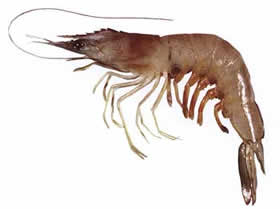Banana Prawn
Banana prawns are a rising favourite for Australians due to their light, sweet flavour. They present well as they retain their shape when cooked. Banana prawns are more commonly used in hot dishes rather than in cold salads or platters.
The traditional cooking methods for other species of prawn (such as shallow frying and barbecuing) can be used for banana prawns. They are also ideal for use in seafood dishes such as prawn cakes or terrines.
A favourite in Asian dishes, banana prawns are well suited to spicy flavours. Chilli jam is an excellent accompaniment. Thai-style coconut curries and avocado cocktails are also a delight.
Flavour: Mild, Delicate and sweet flavour
Oiliness: Low
Moisture: Moist
Texture: Firm, Fine flakes
Flesh Colour: White
Thickness: Thick fillets
Bones: A few bones (mainly pin bones), which are generally large and easily removed
Price: Banana prawns are medium-priced prawns. Redleg banana prawns cost more than white banana prawns because of their brighter colour and larger size.
Edibility: Flesh and roe
Suggested Wines
With grilled (especially char-grilled) banana prawns try wooded, dry white styles of wine, such as cool climate rieslings or a semillon from South Australia or Queensland, that will complement the stronger flavours.
When Caught
Caught year round, with peak supply in April. The banana prawn fishery is closed from December through March and again in July in the Northern Territory. In Western Australia it is closed from December through February. Various trawl fishery closures occu
Cooking Ideas
| Bake | Deep Fry | |
| Grill/ | Poach | Raw |
| Shallow Fry | Smoke | Steam/microwave |
Important Features
Wild/Farmed
Wild and Farmed
Habitat
Saltwater
Common Coral Trout Research
FRDC provides a comprehensive search of the latest research papers and images on Common Coral Trout
Remarks
Banana prawns are an economical alternative to the king prawn species.
Banana prawns are mostly caught during the day, and in some areas good annual catches are linked with heavy rainfall earlier in summer.
The two species can be distinguished by their leg colour red in the redleg banana prawn, and cream or yellow in the white banana prawn.
Imports Borneo, Indonesia and Myanmar
Common Size 14 to 17 cm body length
Overseas Names
General: Indian white prawn
Alternatives
bug, Endeavour prawn, king prawn, tiger prawn, freshwater crayfish, school prawn
Coral trout weighing 0.6 1.0 kg are sometimes called plate size.
Nutrition Facts
per 100g of raw product
| Kilojoules | na |
| Cholesterol | 120mg |
| Sodium | na |
| Total fat (oil) | 0.9g |
| Saturated fat | 36% of total fat |
| Monounsaturated fat | 24% of total fat |
| Polyunsaturated fat | 40% of total fat |
| Omega-3, EPA | 49 mg |
| Omega-3, DHA | 51 mg |
| Omega-6, AA | 43 mg |
Data presented are for white banana prawn.
